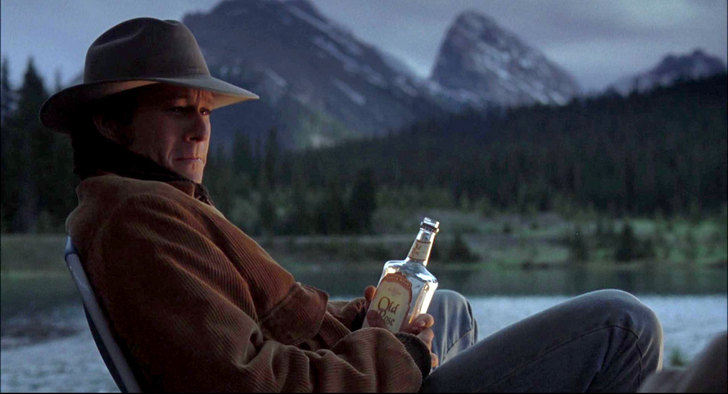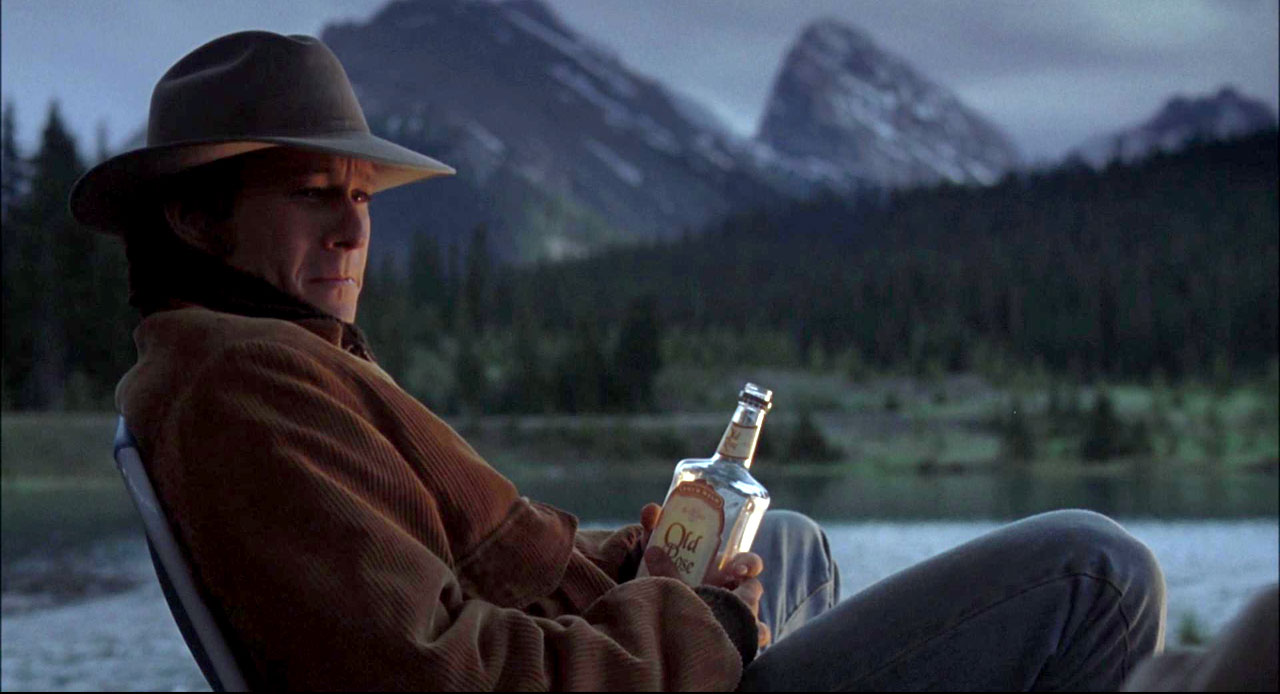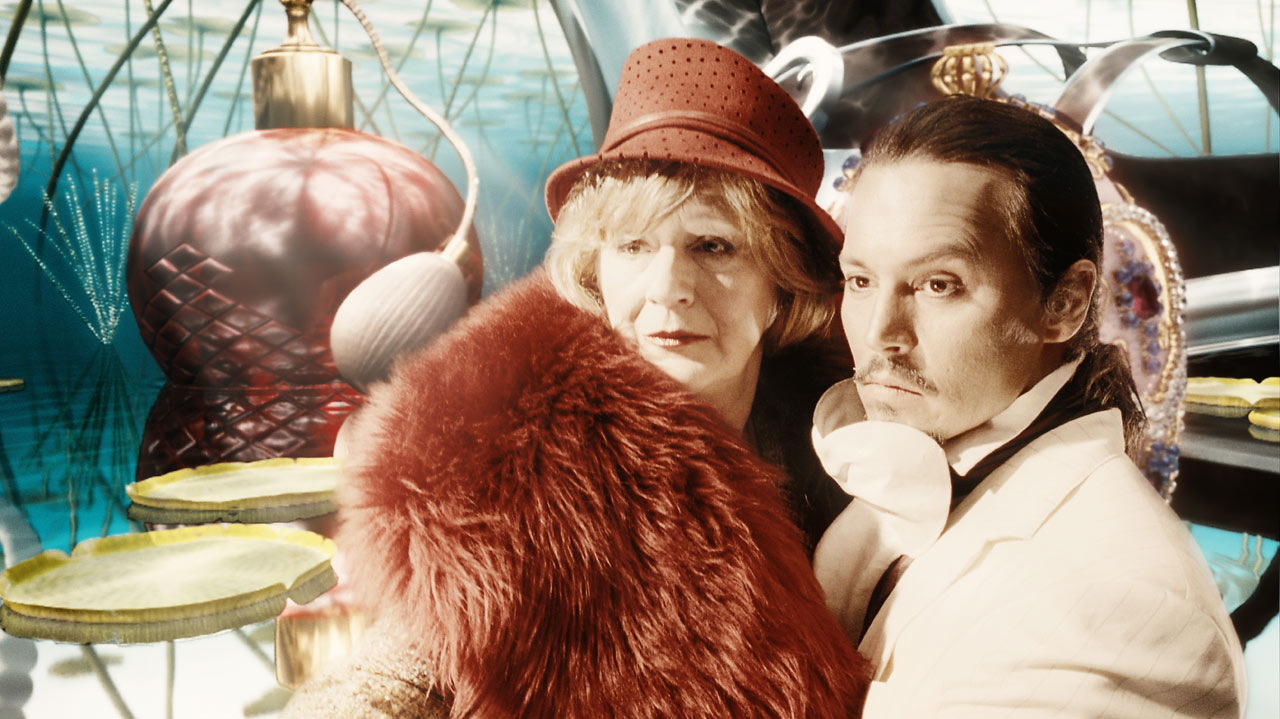Brokeback Mountain
 “Y’know, I’m not queer,” growls Heath Ledger. “Me neither,” murmurs Jake Gyllenhaal, only a little less convincingly.
“Y’know, I’m not queer,” growls Heath Ledger. “Me neither,” murmurs Jake Gyllenhaal, only a little less convincingly.
When he makes the gravelly declaration, Ledger, playing ranch hand Ennis Del Mar, has just clambered out of the tent where he spent a cozy night after roughly shagging his cowboy companion Jack Twist (Gyllenhaal), with whom he’s sharing a sheep-ranching gig — the kind of job you only take for a guaranteed pay-out when prospects elsewhere seem dim. Gyllenhaal’s quiet complacency contrasts with Ledger’s stern declaration. Having satisfied what may be transitory needs, the two of them are operating at emotional cross-purposes — Ennis trying to assert the encounter as a drunken aberration, and Jack balancing that discomfort against his own desires. He seems happy to say whatever’s most likely to keep his new lover close to him the longest.
And so it goes on Brokeback Mountain, where the stunning Wyoming landscape plays in grand emotional counterpoint to the awkward romance depicted on screen. There’s a lovely visual shorthand in the film’s early reels, in which swarms of sheep are seen flocking from one edge of the screen to the other, or simply wandering around randomly, making hapless bleating noises. The animals seem to have something in common with the two young men — it’s a poetic evocation of emotional clumsiness and a masculine vulnerability that helps bring their relationship to life. There’s poetry, too, in the film’s knowing subversion of traditional western iconography. It isn’t a western, but it puts those tropes to sly use: the gentle, twangy soundtrack music, the big-sky vistas, and the way a couple of cowboys size each other up from underneath the brims of big hats and the shadow of lonesomeness.
Brokeback Mountain is a love story that begins with drunken fumblings in a dark tent and follows the strange, growing romance — a difficult thing for two men to share — across time and space, from Wyoming to Texas and back again, over and over, and from one generation through the next. It deals in a range of emotions sweeping from befuddlement and anger to arousal and contentment and all the way back around again to desperation and impotence. It’s about the sensuality of the American west and the sex drive of lost boys — wayward children and, later, husbands whose duty to propriety is squarely at odds with what lives in their hearts. And it’s about the violence wrought on those souls.
As director Ang Lee sought to recover from the commercial debacle that was Hulk, the announcement that he was tackling a gay cowboy movie sounded like the punchline to a South Park gag, or an invitation to high camp. And yet there was the film’s literary pedigree — an E. Annie Proulx short story that originated in The New Yorker — and the news that Ledger and Gyllenhall (the former a full-on and the latter at least recognizable to a mainstream audience if not necessarily a household name) had signed on to star, presumably with no intentions of making punchlines of themselves. The resulting film, both wildly romantic and fairly realistic about human emotion, treads less cautiously than any mainstream movie I can think of about gay men. It boasts shirtless grappling, nude swimming, full-on kissing and one brief, moderately explicit scene depicting appropriately fierce lovemaking — maybe hot enough to give Gregg Araki a boner.
It’s also pretty terrific stuff by any measure, full of detailed characterizations, and unashamed, misty-eyed sentiment that pushes precisely the right buttons. I haven't read the source material, but it seems rich with symbolism and careful observation, and Larry McMurtry and his writing partner Diana Ossana do right by it, crafting both a rugged character study and a love story that seems somehow of a piece with the drawls, saunters and tumbleweeds that characterize the milieu. Crucially for a film that needs to depict a credible relationship above all else, Ledger’s depiction of a wannabe man’s man who twists his heart and brain into pretzel knots trying to reconcile his perceptions of himself is easily one of the best performances given by anyone, anywhere, in ages.
If Lee’s proved anything over the years, it’s that he’s one of the most sensitive directors we have. If Hulk was a misstep, it’s mainly because Lee tried so hard to cross a real comic-book narrative with an epic tragedy about repressed emotion — his great subject — and found that, without the kind of effortless pulpiness that he’s no good at (but which comes naturally to, for instance, Sam Raimi) the juxtaposition made for fairly boring cinema. But on the evidence of films as superficially disparate as Sense and Sensibility, The Ice Storm and Crouching Tiger, Hidden Dragon, he’s exceedingly good at teasing out nuanced performances that reflect the fundamentally tight-wound psyches of characters who can barely contemplate the idea of emotional expression. Brokeback Mountain gets erotic juice from some sexy horseplay, to be sure, but it’s also charged up by Lee’s interest in the faces of his actors — Ennis’s explosiveness that night in the tent is more potent for the desperate slow burn Ledger does throughout the picture, and if Gyllenhaal’s guilelessness feels a little like affectation, it turns out to be part of Jack’s charm. In more ways than one, he’s a contemporary cowboy trapped in old-fashioned environs, and Lee’s camera studies the winsome openness that Ennis is drawn to precisely because it’s the opposite of everything he is.
What else defines Lee’s directorial style? He’s good at planting the camera at an ideal vantage for taking in, say, the entirety of a small room, or a handsome man reflected in a rear-view mirror. At the same time, he’s perhaps a little too fond of the tasteful camera move — looking briefly through a doorway, then panning slowly to the left to take in somebody doing the dishes, or tracking gently from side to side, framing Ledger first over one of Gyllenhaal’s shoulders and then the other, placing Jake as the center around whom Heath orbits helplessly. Lee modulates that style throughout, choosing different shooting strategies as the story turns more despairingly to the subject of denial. There’s a bit of grisly material, which Lee faces head-on but cuts away from quickly; the rhythm says that the evil men do is more than he can bear to contemplate for long — or at least to foist off on his audience. (In a movie that’s partly about maintaining an illusion in the face of scary bigotry, intolerance casts a long enough shadow without lingering on its casualties.) The studied stylistic effects are highly traditional but very satisfying in an old-school kind of way.
Team Lee with new-school cinematographer Rodrigo Prieto (21 Grams, 25th Hour), which may seem counter-intuitive, and you’ve got something going on. In the early sequences, Prieto’s photography lends the landscape of Brokeback Mountain a dreamy cast that underscores its symbolism for Ennis later in life. There’s a gorgeous love scene where the shirtless Ledger and Gyllenhaal are dappled in golden light; contrast that treatment with the sequences from married life later in the film, where Anne Hathaway and Michelle Williams both appear topless in sex scenes, but under the flattest possible lighting schemes. They’re lovely women, and the film treats them as real human beings — Hathaway’s daddy’s girl remains a bit of a cipher all the way through, but Lee’s very interested in the emotions playing out behind Williams’ narrowed eyeballs as she figures out what her husband’s really doing on all those “fishing trips” with his good buddy from Texas — but women are not, for a change, the objects of desire here.
Then again, Brokeback Mountain isn’t really about desire — or, rather, it isn’t only about that. The first act is a gorgeous essay on longing, erotic and otherwise, characterized by the terrific, lengthy shot in which Gyllenhaal’s face, a little smile playing thereabouts, fills the foreground of the screen with a crouching, naked Ledger visible in the background, splashing water against his nether regions. The question is whether Jake will turn around, or glance back, or smirk, or close his eyes, or hitch in his breath — and of course Gyllenhaal never does a damned one of those things. It put a grin on my face.
But the second and third acts are about settling into routine and hiding from one’s nature, things that gay men have historically had incentive to become very good at. Jack settles down with a precocious cowgirl and Ennis marries his unprepossessing sweetheart. Both of them start families and grow very unhappy together; the men retreat on a regular basis to the wilderness and take solace in one another’s arms. (“You don’t go up there to fish!” Ennis’s poor wife is reduced to sputtering, her husband having taken one too many euphemistic “fishing trips” on Brokeback Mountain.) Manliness is a subject here, too, and it’s Ennis’s tendency toward conformity that makes his own happiness impossible. Jack comes to uneasy terms with his sexuality, but Ennis’s essential confusion bubbles over in the form of a frightening violent rage that, Lee suggests, is as American as fireworks.
Composer Gustavo Santaolalla, like Prieto an erstwhile collaborator with Amores Perros director Alejandro González Iñárritu, delivers a mournful variant on the traditional country-and-western instrumental, and Willie Nelson (covering Dylan) and Rufus Wainwright contribute songs to the end credits. The music puts the finishing emotional touches on a piece of work that’s supremely manipulative but emotionally powerful. It’s true that it stumbles occasionally. The two leads argue near the end of the film in a Big Scene that bears the most obvious hallmarks of Oscar bait — exposition to deliver, character notes to hit. Gyllenhaal is an uneven performer, and in some scenes, Ledger’s performance outshines his to the point of distraction. (He’s much better playing the sad middle-ager than the exuberant youngster.) And if the editorial strategy seems less than completely formed (the job was started by the terrific Geraldine Peroni, leaving Dylan Tichenor to take it up after her death last year), with the fragmented and wide-ranging narrative seeming to sputter forward in fits and starts, traversing months and even years with little warning or acknowledgement, it works out anyway because this is less a forward-moving narrative than a sorrowful remembrance of things past — a romance that takes place mainly inside the brainpans of aging characters, who nurture their own unattainable hopes for happiness as they grasp ever more desperately at fading memories of the best place they ever knew.
Although it’s mostly about the consequences of not getting enough of it, movies that so credibly depict the internal charge of erotic love are rare and precious. By directing what may be the first Hollywood-style gay romance, Lee has made the most of the chance to once again make physical affection on screen seem fresh and startling — and despite its importance in story terms, the gender of the characters is largely irrelevant to the film’s greater emotional resonance. An impassioned argument for tolerance and erotic self-expression, Brokeback Mountain’s cumulative effect is curiously contradictory. Coming at a cultural moment when the U.S. seems more open than ever before to the idea that gays are people too, it feels more optimistic than gloomy. The subject is repression, the mood melancholy and the emotional impact devastating, but there’s hot blood pumping through its veins and loins.
Posted by on December 8, 2023 11:12 PM

